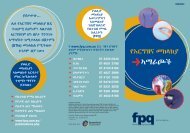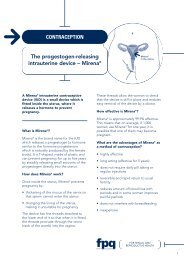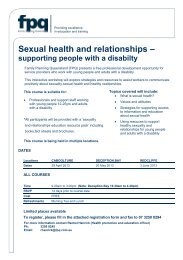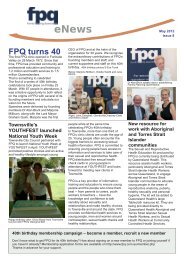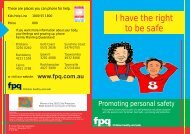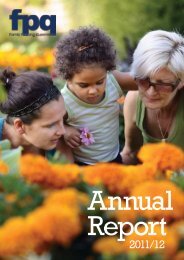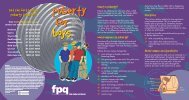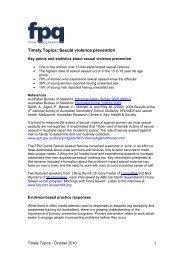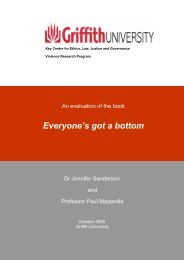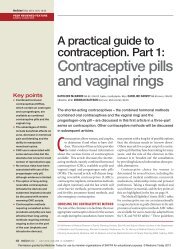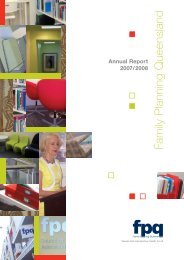About Periods brochure - Family Planning Queensland
About Periods brochure - Family Planning Queensland
About Periods brochure - Family Planning Queensland
You also want an ePaper? Increase the reach of your titles
YUMPU automatically turns print PDFs into web optimized ePapers that Google loves.
Get the facts about<br />
periods from FPQ<br />
Visit www.fpq.com.au, or<br />
contact one of the following locations:<br />
Brisbane 07 3250 0240<br />
Cairns 07 4051 3788<br />
Townsville 07 4723 8184<br />
Rockhampton 07 4921 3655<br />
Sunshine Coast 07 5479 0755<br />
Gold Coast 07 5531 2636<br />
Ipswich 07 3281 4088<br />
<strong>About</strong><br />
<strong>Periods</strong><br />
Puberty and periods<br />
Most girls go<br />
through puberty<br />
between the ages<br />
of 9 and 16.<br />
During puberty<br />
your body changes.<br />
Your breasts get<br />
bigger and hair<br />
starts to grow<br />
between your legs.<br />
During puberty<br />
most girls will start<br />
their period.<br />
Getting periods is healthy. The blood<br />
that comes out is healthy blood. You<br />
have not been hurt.<br />
Your period will last for a number of<br />
days. When you have a period you<br />
will need to use a pad or tampon.<br />
What will a period<br />
feel like?<br />
Everybody is different. You might<br />
feel a bit sick or sore in your tummy.<br />
Maybe you will get a bit cranky or<br />
tired before your period starts.<br />
Some women feel fine.<br />
Toowoomba 07 4632 8166<br />
What is a period?<br />
If you do feel sick or sore, talk to<br />
someone you trust, or see your doctor<br />
for help.<br />
Note: This <strong>brochure</strong> has been developed for people with learning difficulties.<br />
Publications are most effective when used as part of a comprehensive sexuality<br />
education program.<br />
Disclaimer<br />
<strong>Family</strong> <strong>Planning</strong> <strong>Queensland</strong> (FPQ) has taken every care to ensure that the information<br />
contained in this publication is accurate and up-to-date at the time of being published.<br />
As information and knowledge is constantly changing, readers are strongly advised to<br />
confirm that the information complies with present research, legislation and policy<br />
guidelines. FPQ accepts no responsibility for difficulties that may arise as a result of an<br />
individual acting on the advice and recommendations it contains.<br />
A period means that blood comes<br />
from inside your body through an<br />
opening between your legs. This<br />
opening is called a vagina.<br />
© <strong>Family</strong> <strong>Planning</strong> <strong>Queensland</strong><br />
Version 4 / March 2010<br />
P: 03/2010 5m<br />
ADVOCATING FOR<br />
INCLUSIVE SEXUALITY<br />
EDUCATION<br />
vulva<br />
vagina<br />
Funded with assistance by
Other things about periods<br />
Check your pad when you go to the<br />
toilet to see if it needs to be changed.<br />
Changing your pad or tampon<br />
<strong>Periods</strong> are private. You can talk<br />
about them with people you know<br />
and trust, but not to just anyone.<br />
You will have a period about once<br />
a month.<br />
Check your pad:<br />
in the morning<br />
morning tea<br />
lunch<br />
dinner<br />
before bed<br />
Change your pad or tampon in a private<br />
place. The toilet, bathroom and bedroom<br />
are private places when the door is closed.<br />
1 Wash your hands.<br />
5<br />
Stick pad down on your underpants<br />
or insert tampon into your vagina.<br />
In the first year you might not get a<br />
period once a month. It will take time<br />
for your body to become used to<br />
having periods.<br />
6<br />
Pull your underpants back up and<br />
tidy your clothes.<br />
Most women stop having periods<br />
when they are about 50.<br />
Mark on a calendar when you start<br />
your period. This may help you know<br />
when your next period will come.<br />
What is a tampon?<br />
A tampon can be used<br />
for periods. It is put inside<br />
the vagina.<br />
Tampons should be changed at least<br />
4 times a day.<br />
2<br />
3<br />
Take off your used pad or remove<br />
tampon.<br />
Wrap it in toilet paper, or put in a<br />
paper bag.<br />
7<br />
Put the used pad or tampon into<br />
a bin.<br />
What is a pad?<br />
A pad is put inside your underpants<br />
to keep your clothes clean while you<br />
have your period. Pads should be<br />
changed every 2 to 4 hours.<br />
Tampons take time to get used to.<br />
They can be good when swimming,<br />
dancing and playing some sports.<br />
At night while you are sleeping, you<br />
might want to wear a pad.<br />
Some women prefer to use tampons<br />
and some women prefer to use pads.<br />
Everyone is different.<br />
4<br />
Peel strip off clean pad or unwrap<br />
tampon.<br />
8 Wash your hands.<br />
If you need help to change your pad<br />
or tampon, ask someone you trust.



